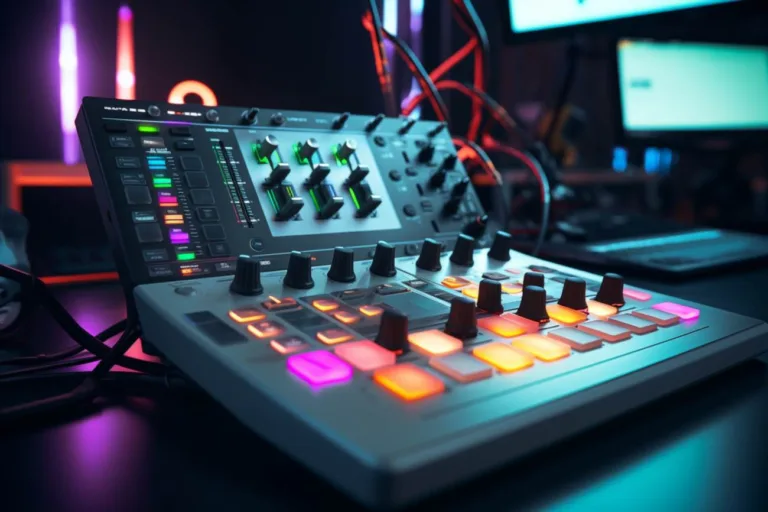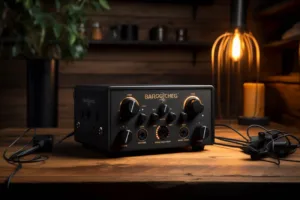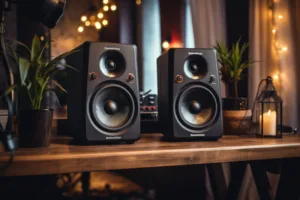Welcome to our comprehensive guide on the fascinating world of MIDI controllers! Whether you’re a seasoned musician, a budding producer, or simply curious about the realms of electronic music, a MIDI controller is a crucial tool that empowers you to harness the potential of digital soundscapes. In this article, we will delve deep into the intricacies of MIDI controllers, exploring their functionalities, types, benefits, and how they are revolutionizing the way music is composed, performed, and produced.
Understanding midi controllers
MIDI, which stands for Musical Instrument Digital Interface, is a protocol that allows electronic musical instruments, computers, and other devices to communicate and synchronize with each other. A MIDI controller, as the name suggests, is a device used to control MIDI-equipped instruments and software. It serves as a bridge between the musician’s intentions and the electronic realm of music.
How MIDI Controllers Work
A MIDI controller generates MIDI data when you interact with it. This interaction can include pressing keys, tapping pads, turning knobs, sliding faders, and more. The MIDI data generated by the controller is then transmitted to MIDI-compatible devices, such as synthesizers, virtual instruments, and digital audio workstations (DAWs). The receiving device interprets this MIDI data and produces corresponding musical sounds.
Types of midi controllers
MIDI controllers come in a diverse range of forms, each designed to cater to specific musical preferences and production workflows.
1. Keyboard Controllers
Keyboard MIDI controllers mimic traditional pianos and synthesizers. They feature keys that can be pressed to produce different pitches and sounds. These controllers are favored by pianists, keyboardists, and composers.
2. Pad Controllers
Pad MIDI controllers are equipped with drum pads that can be tapped to trigger drum sounds, samples, and effects. They are a staple in electronic music production and live performances.
3. Knob and Fader Controllers
These controllers feature knobs, sliders, and buttons that can be assigned to control various parameters such as volume, modulation, and effects in real-time.
4. Wind Controllers
Wind MIDI controllers, like the MIDI saxophone, flute, or trumpet, cater to wind instrumentalists. They convert breath and finger movements into MIDI data for expressive performances.
Benefits of midi controllers
MIDI controllers have transformed the music production landscape, offering several advantages:
1. Expressive Creativity
MIDI controllers enable musicians to infuse their performances with expressive nuances that go beyond the limitations of traditional instruments.
2. Versatility
They allow for versatile sound manipulation, letting artists experiment with a wide range of instruments and effects using a single device.
3. Production Efficiency
For producers, MIDI controllers streamline the process of creating, arranging, and mixing music within digital audio workstations.
4. Live Performance
MIDI controllers are essential for electronic music performances, allowing artists to interact with their audience in real-time.
The future of midi controllers
As technology continues to evolve, so does the realm of MIDI controllers. We are witnessing advancements such as:
1. Gesture Recognition
Controllers that respond to gestures and movements, offering new dimensions of interaction.
2. Wireless Connectivity
Wireless MIDI controllers that provide greater mobility and freedom of movement during performances.
3. Integration of AI
Artificial intelligence being integrated into MIDI controllers, aiding in music composition and performance.
Frequently Asked Questions (FAQs)
Q: Can I use multiple MIDI controllers simultaneously?
A: Yes, many software and hardware setups allow you to connect and use multiple MIDI controllers simultaneously for intricate control.
Q: Are MIDI controllers suitable for beginners?
A: Absolutely! MIDI controllers cater to musicians of all skill levels, providing an intuitive platform to explore and create music.
Q: Do I need technical expertise to use a MIDI controller?
A: While some controllers offer advanced features, most are designed to be user-friendly, requiring minimal technical knowledge to get started.
Q: Can MIDI controllers replace traditional instruments?
A: MIDI controllers offer unique capabilities, but they don’t replace traditional instruments. Instead, they complement and expand creative possibilities.
In conclusion, MIDI controllers have revolutionized music production, performance, and composition. With their diverse types, expressive potential, and evolving technology, they are essential tools for modern musicians and producers. Whether you’re a seasoned expert or just starting, a MIDI controller opens up a world of sonic exploration and creativity.
Vezi și:






